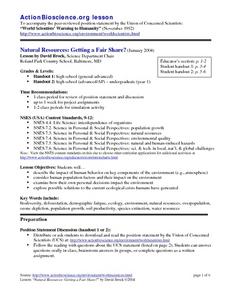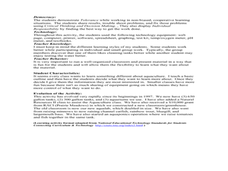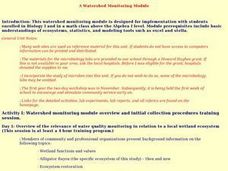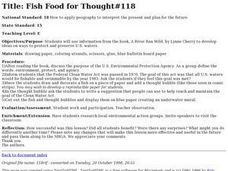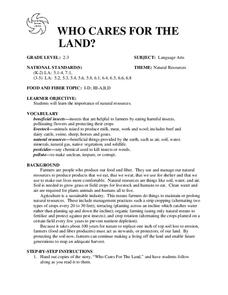NOAA
The Dead Zone
The fifth installment of a 23-part NOAA Enrichment in Marine sciences and Oceanography (NEMO) program defines dead zones and how they form. Pupils then examine data from the Gulf of Mexico to determine dead zone formation.
Teach Engineering
Chromatography Lab
Groups use alcohol and chromatography paper to separate the color components of black ink. The purpose of the activity is to allow the class to become aware that mixtures exist in hidden places.
Curated OER
Tall as a Mountain, Flat as a Plain
Students examine a variety of landforms that are found on the Earth and compare and contrast the distinguishing qualities of these forms. A topographical model of the landforms is made.
Curated OER
Land Use Issues
Students examine soil types and determine the ability of each to absorb water. Working in groups, they time how long it takes for water to seep out the bottom of the cups. They examine soil components, conservation, erosion, and tree...
Curated OER
Let the Sunshine In
Ninth graders conduct an experiment which demonstrates the absorption and reflection of sunlight by measuring the heat flow through various window coverings. They predict the relative amount of the sun's heat. Students draw conclusions...
Curated OER
Inquiry-based Investigations into Pond Water Microorganisms
Pupils become familiar with common microorganisms and experience exploring the microbial world.
Curated OER
Natural Resources: Getting a Fair Share?
Students explore the impact of human behavior on key components of the environment, examine how theirn own personal decisions have added to the problem, and explore possible solutions to the current ecological crisis.
Curated OER
Aquaculture Production in the Classroom
High schoolers study the basics of aquaculture and how to successfully raise aquatic plants and animals. In this water lesson students perform water quality tests on fish tanks, record and graph their results.
Curated OER
Scavenger Hunt
Students research water quality issues and the impact on the environment using the Internet.
Curated OER
Sarita Wetland Restoration
Students collaborate on the plannng and implementation of the Sarita Wetland Restoration. The Sarita Wetland is the remnant of former Lake Sarita that was drained in the early 1900's. The goal of the entire project is to improve water...
Curated OER
A Watershed Monitoring Module
High schoolers explore the relevance of water quality monitoring in relation to a local wetland ecosystem. They conduct standard water quality tests using wet tests and CBL calculators and probes. Student record and interpret the results.
Curated OER
Fish Food for Thought
Young scholars examine the role of the US Environmental Protection Agency and the Federal Clean Water Act of 1970 after reading Lynne Cherry's, A River Ran Wild. They decide if the goals of the act were met and create a fish cartoon that...
Curated OER
Journaling
Learners explore journal writing. In this writing lesson, students are given writing prompts such as "how the choices I make affect our water quality?" and use critical writing skills to express their feelings in a journal. There are...
Curated OER
What is Wastewater Treatment
Students watch and discuss a video on wastewater treatment. They write a brief summary of the film and the discussion. Then they read a pamphlet on clean water and write a one page summary.
Curated OER
Observation Journal
In this ocean life learning exercise, students observe the plants, animals, human activity, park rules/local laws, at a specific location. Students also observe any activity in neighborhoods, the water sources for the area, the water...
Curated OER
Class Conservation Corps (CCC)
Students investigate how the loss of soil, a valuable natural resource, affects their lives through loss of productive land to grow food, loss of coastal land mass, and poor water quality from runoff. They design a project to keep soil...
Curated OER
SAV Plants of the St. Mary¿¿¿s River Ecosystem
Students examine the importance of submerged aquatic vegetation in the St. Mary River ecosystem. They identify different characteristics of common eelgrass and discuss water quality, photosynthesis, habitat, oxygen production.
Curated OER
Pea Soup Ponds
Students perform an experiment where they learn how water can be polluted by algal bloom. They grow algae with different concentrations of fertilizers or nutrients and analyze their results.
Curated OER
Groundwater Pollution Lab
In this groundwater pollution instructional activity, students use a piece of bread to represent the earth, food coloring to represent contaminants in the ground and water to simulate the movement of pollutants with water through the...
Curated OER
Understanding pH, Alkalinity, and Hardness
Students comprehend the interactions of pH, alkalinity, hardness, and carbon dioxide in aquaculture water. They read the SRAC fact sheet number 464 "Interactions of pH, Carbon Dioxide, Alkalintiy and Hardness in Fish Ponds." Students...
Curated OER
Recycling
Third graders observe the importance of recycling. In this environmental activity, 3rd graders will view experiments on water filtration, paper-making, and breathing pollutants, and will categorize recyclable materials.
Curated OER
Do As the Romans: Construct an Aqueduct!
Students explore how the Romans engineered and built aqueducts. They read a manual, explore the Construct a Roman Aqueduct online activity, and construct an aqueduct that will transport two liters of water across a short distance in the...
Curated OER
WHO CARES FOR THE LAND?
Students explore the importance of natural resources. They are given copies of the story, "Who Cares For The Land," and students follow
along as the teacher reads it. Students identify the key points in the story. (Soil, water and air...
Curated OER
Microbiology Lesson
Learners collect water samples and use a microscope to find bacteria in the samples. They categorize the different bacteria they find, determine the number of colonies there are, and predict how the bacteria levels might affect animals...
Other popular searches
- Clean Water Act
- Clean Water Act Epa
- Drinking Water Quality
- Water Treatment Plants
- Water Quality Testing
- Water Quality Index
- Watershed and Water Quality
- Nitrates and Water Quality
- Clean Water Act of 1972
- Clean Water Treatment Plant
- Water Quality Analysis
- Urban Water Quality








